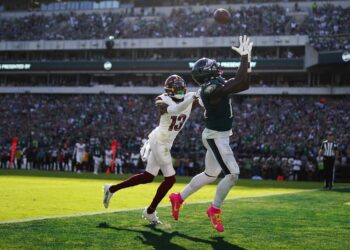As shocking as the Luka/AD trade was, I have a seeking feeling that, in a few years, we will collectively look back at this trade as a watershed moment in NBA history.
The Mavericks, fresh off of an NBA Finals appearance, just traded a 25-year-old superstar wing for a 32-year-old big that’s aging out of his prime. On the surface, the deal is a head-scratcher for a Dallas team with championship aspirations, but I’m here to tell you that not only were the Mavericks right in moving on from Luka Dončić, but they may have ripped off the bandaid for the rest of the league when it comes to unique superstar situations like this one.
There’s a lot to this, so let this serve as your warning, this may take a while.
The first layer of the onion that led to the Mavericks emphatically getting out of the Luca Dončić business is actually a question. “What does being a contender in the NBA actually mean?” Are you a contender if you make the playoffs? Are you a contender if you make it to the second round? Or are you only a contender if you have a real chance at hoisting the Larry O’Brien Trophy in June? I prescribe to the belief that you’re only a contender if you truly believe your team can win a championship without metric tonnes of luck, meaning there’s never more than a handful of contenders every year. As we sit here in early February, there are only three teams in the East (Celtics, Cavs, and Bucks) and maybe four in the West (Thunder, Nuggets, Grizzlies, and Rockets) that truly feel like they have a championship ceiling. The rest of the league simply doesn’t have what it takes to be the last team standing. Sure, there are surprising finals runs like the Mavericks had last year and the Suns had in 2021, but it’s been a long LONG time since we’ve had a surprise champion. Ironically, the last champion I’d classify as a surprise is probably the 2011 Mavs who beat the Big 3 in Miami in their first year together. Surprise Finals runs usually end in five or six games with the better team winning.
What does any of this have to do with the Luka Dončić trade you ask? Let me explain.
One year ago today, on February 3rd, 2024 the Mavericks lost to the Bucks 129-117 dropping their record to 26-23, good enough for 8th in the Western Conference on a night that Luka scored 40 and grabbed 9 boards to go along with 11 assists. As the 8th seed, the Mavericks were a playoff team but lost by 12 to a true contender despite their best player missing out on a 40-point triple-double by one rebound. At that moment in time, they were just like two dozen or so other NBA teams that were too good to tank but not a true championship contender. NBA Purgatory.
However, starting with their next game two nights later against the 76ers, the Mavs rattled off seven wins in a row and finished the regular season on a 14-7 run (before resting their starters for the final 2 games of the regular season) and entered the postseason as the 5th seed in the Western Conference. They went on to win their first-round series against the LA Clippers 4-2, their second-round series against the #1 seed Thunder 4-2, and eventually won the West 4-1 against the Timberwolves. Simply put, they caught lightning in a bottle and had a fairytale run to the NBA Finals where they were quickly dismissed in 5 by the Celtics. Everything broke right for the Mavericks during their playoff run and they still lost via a gentlemen’s sweep to a significantly superior, and far more balanced, team in the NBA Finals. Although they were just three wins away from a championship, it was clear to anybody watching, including the Dallas Mavericks’s decision makers that they were not a team on the doorstep of a championship and that the duo of Kyrie and Luka may be enough to flirt with the Finals for the next few years but it won’t be enough to get their hands on the ultimate prize. That’s the first layer to this trade-onion.
The second layer is that despite Luka being a certified stud offensively, he’s a terrible liability defensively. In the Finals, the Celtics picked on Luka on the defensive end of the floor all series long. He took plays off and committed lazy fouls. Just look at his defensive effort on this Jaylen Brown fast break.
Zero effort.
This is just one example of Luka’s defense being so bad that it more than cancels out his offensive wizdary. Check out this 2:33 compliation of Luka being a defensve liability in last years Finals.
Offense wins games, but defense wins championships and Luka Dončić is a defensive liability. Remember the February 3, 2024 game I referenced above in which he slashed 40/9/11 and lost? He also committed 9 turnovers and was a -12, the exact margin the Mavs lost the game by.
The third layer to this onion sort of piggybacks on his poor defense, and that’s his weight. For a professional athlete, Luka Dončić is fat. At just 25 years old, a point that comes up in almost every article and discussion about this trade, Luka should be in the physical prime of his life but instead, he looks like he eats McDonald’s on the way to practice and takes down a large pizza every night before bed. I’m not diatitioin but I’d guestimate that Luka is carrying around an extra 25 pounds, night in and night out, up and down the floor in the most competitive basketball league in the world. If Luka lost that extra weight, something that should not be hard for a 25-year-old professional athlete, would his stamina improve allowing him to play slightly better defense? Who knows, but what we can all be pretty sure of is that getting in real basketball shape would help him with his availability. Over the first 6.5 years of his NBA career, he’s constantly battled nagging injuries that keep him out of the lineup for a handful of games and limit his effectiveness in even more.
What can’t be forgotten in all of this is that the Mavericks have had Luka IN THIER BUILDING for 6.5 seasons including a Finals run, and still decided to send him packing which, to me, means they have tried everything to help him get in, and stay in shape. When you have a talent like Luka Dončić on your team you owe it to yourself and your fans to leave no stone unturned in an effort to get the most out of your superstar. One can only assume they’ve hired him a personal chef, had him work with a psychiatrist to get to the bottom of his poor dietary choices, and presumably tried a myriad of other things to help him with his fitness to no avail.
There’s either something else going on that we, the unwashed masses, don’t know about OR Luka simply doesn’t care and refuses to change his ways and put in the work. Either way, a weight problem in your mid-20s isn’t the type of thing that gets better as a player gets older. In fact, in most cases, it gets worse.
The fourth and final layer of this onion is Luka’s contract situation. He’s currently in the third year of a 5-year $215M contract that includes a player option for the 2026-27 season meaning he’s only under contract for two more playoff runs. Given his career accolades that include 5-straight First Team All-NBA appearances, Dončić was eligible for a super-max extension with the Mavericks this summer. Since the super-max is defined as a percentage of a team’s salary cap, Luka would have been eligible for a 5-year $345 deal that works out to a mind-boggling $69M per season. Before this trade went through, it was assumed that Luka signing that hypothetical contract was nothing more than a formality given his age and standing in the league, but the Mavericks didn’t feel the same way. If this summer came and went without the team offering the $345 super-max, Luka would have taken that personally and things would have gotten ugly with a ton of teams calling the Mavs looking to trade for the disgruntled superstar.
It’s interesting to note that after being traded, Dončić is now only eligible for a 5-year $229M deal that works out to $45.8M per year, a number that’s much more palatable to organizations than the staggering $69M number he’d have been eligible for this summer.
In my opening, I said that I thought this trade may be a watershed moment for the way NBA teams handle their superstars and after spending the last two hours writing about all of Luka’s flaws, I’m even more convinced of that than I was before. Every year a perennial All-Star becomes eligible for the super-max contract, and up until now, they always end up resigning with their current team for the largest payday possible. In each of the last two offseasons, the Celtics have signed Jaylen Brown and Jayson Tatum to super-max deals locking the dynamic duo in for the next five seasons. While signing Tatum was a no-brainer, the Jaylen Brown deal was not as cut and dry. For as talented as Jaylen is, his game is not without flaws and his ability to coexist with Tatum was still up for questioning before last year’s title run. Things worked out for the Celtics, but things don’t always work out for the teams signing their players to a super-max. Just look at Joel Embiid, another player who struggles with fitness, Bradley Beal, Devin Booker, and John Wall. Each of those players signed a super-max and has not lived up to the lofty expectations that come with that deal.
For the first time, a team looked at their super-max-eligible superstar and decided he wasn’t worth the money and the associated team-building constraints that come along with one player taking up that much of their salary cap. For the first time, an organization didn’t feel handcuffed by their superstar and chose to chart a new course without the face of their franchise in the fold for the long term. For the first time, a team realized that they’d reached their ceiling and that an NBA Championship was not in the cards for their team as currently constructed. And for the first time, a team looked at their best player and decided not to overlook their flaws, both personal and on-court, instead of being blinded by aura.
Being the first to do something is always the hardest (and most memorable), but the NBA is a copycat league and I’d be shocked if we don’t see more of this over the next half-decade or so.




